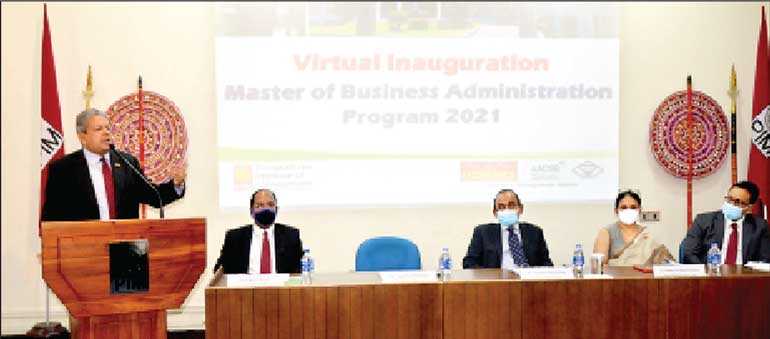Wednesday Feb 18, 2026
Wednesday Feb 18, 2026
Monday, 11 January 2021 00:00 - - {{hitsCtrl.values.hits}}

PIM Director Prof. Ajantha Dharmasiri addressing the gathering, while (from left) PIM Head of Academic Affairs Dr. Trevor Mendis, Peoples’ Bank Chairman Sujeewa Rajapakse, PIM Head, Research Centre Dr. Nilakshi Galahitiyawa, and PIM Alumni President Denzil Perera look on
The resilience and revival needed in the context of the COVID-19 pandemic require well-groomed  leaders in all fronts. As Peter Drucker said, there are not good or bad institutions but either well-managed or ill-managed ones. This is truly relevant to a nation as well. It sets an appropriate space to discuss the need to have ‘mind before action’. It is the acronym we promote to showcase the calibre of an MBA (Master of Business Administration). Today’s column will pursue it further, in the context of commencing the largest MBA batch ever at PIM as its first ever virtual inauguration.
leaders in all fronts. As Peter Drucker said, there are not good or bad institutions but either well-managed or ill-managed ones. This is truly relevant to a nation as well. It sets an appropriate space to discuss the need to have ‘mind before action’. It is the acronym we promote to showcase the calibre of an MBA (Master of Business Administration). Today’s column will pursue it further, in the context of commencing the largest MBA batch ever at PIM as its first ever virtual inauguration.
Overview
The most recent comment on MBAs came from Elon Musk, the dynamic business tycoon of SpaceX and Tesla fame. “There might be too many MBAs running companies.” In his view, the ‘MBA-isation of America’ limits the creation of innovative products and services. This is a wake-up call for MBA designers and delivers to be conscious of continuous change and to do the needed revisions to make it current, relevant, and elegant.
There had been many conversations on the changing face of MBA, the sought-after qualification among managers. It has been hailed as a competency builder on one hand and hacked as a money spinner for mushrooming institutions. I read with interest the constructively critical insights by Dr. Rakesh Khurana on elite Harvard MBA. It reminded me of Henry Mintzberg, the veteran management thinker who was also critical about the typical MBAs on offer.
‘From Higher Aims to Higher Hands’ is the title of the treatise of Dr. Rakesh Khurana. He shows that university-based business schools were founded to train a professional class of managers in the mould of doctors and lawyers but have effectively retreated from that goal, leaving a gaping moral hole at the centre of business education and perhaps in management itself. He clearly calls for reforms in management education. His criticism of Harvard MBA as a ‘uni-polar’ MBA as opposed to being a ‘multi-polar’ MBA is worth reflecting.
According to Khurana, a ‘uni-polar’ MBA trains managers to have lucrative carriers in multinationals and large conglomerates. Instead a ‘multi-polar’ MBA should prepare the candidates in becoming entrepreneurs, setting up SMEs in fostering innovation and partnerships in offering best-cost solutions. It gave me a sense of satisfaction, as the MBA we offer has the scenario of making one out of five of its recipients, entrepreneurs. In fact, we want to make this ratio doubled through the initiatives of the Business Incubation Centre.
More criticisms of MBAs
“Management is a practice. And you learn management by practicing management. Experience is critically important. You don’t become a manager in a classroom and you certainly don’t become a leader in a classroom. Leadership is earned on the basis of people who choose to follow you. It’s not granted or anointed by some holy water granted in a school.” These are the very words of Henry Mintzberg, Professor of Management, at the Desautels Faculty of Management of McGill University in Montreal, Quebec, Canada.
As observed by Harry Costin, “Mintzberg provides a useful distinction between business and management. He argues that MBAs teach the fundamentals of business functions, not the practice of management. What is lost in the discussion is that M.B.A. literally means master of business administration, and therefore, even following Mintzberg’s argument, the degree does not disguise what it is really about. In essence, the term MBA itself is viewed as a misnomer.
There is a wave of criticisms on MBAs around the world. Especially after the global credit crunch and the collapse of giants led by MBAs, this negativity has gathered momentum. I myself have heard from CEOs lamenting that some of their MBAs know a lot of theory but sadly lack the practical approach in applying them into real issues.
Taking this issue into a broader perspective, an ongoing debate in the USA has even reached a point to say that MBA-awarding business schools have an identity crisis. I am confident that we will not allow that to happen to us. Yet, it is better to be proactive than being reactive.
According to Forbes magazine, business schools have always juggled two missions: educating practitioners and creating knowledge through research. 50 years ago, as explained in the 2005 HBR article ‘How Business Schools Lost Their Way’, business schools shifted their focus from the former to the latter. Management became a science rather than a profession. This shift had profound implications. Business schools rewarded professors for publishing their research in academic journals, and their curriculum began to reflect the narrow focus of the faculty. Business school professors became increasingly disconnected from practicing managers and leaders. By the mid-2000s, it became clear that business schools had swung too far in one direction.
Ironically, we have seen a large number of MBAs move up in their career ladder in occupying leadership positions. I see the issue is not with ‘What MBA’ is but more of ‘How MBA’ should be. I presume it is with this spirit, late Prof. Uditha Liyanage, former director of PIMA stated, “Do not ‘do’ an MBA but ‘be’ an MBA”. We have gone one step beyond in requesting the MBA aspirants to ‘be brilliant as an MBA’.
There was a time in Sri Lanka where managers, when facing interviews were asked whether they have an MBA. Now the key decision makers are smart enough to ask instead from ‘where’ they have got their MBA. Amidst a proliferation of a multitude of MBAs, still the authentic products have a high demand.
MBA as a transformation
People’s Bank Chairman Sujeewa Rajapakse recalled his transformation through the PIM MBA. He shared how he gained confidence and competence in handling complex business matters thanks to the MBA experience. He highlighted the need to develop leadership and complemented that the PIM has become the breeding institute of high calibre leaders. He also challenged the aspiring MBAs to be thorough with analytical skills on one side and innovative ideas on the other side.
With rapid technological advancements, the need to have blended learning with the use of ICT tools is on the rise. Also, greater flexibility from the students as well the high standards from the institutions need to be maintained with proper balancing. We have realised the need to ensure quality and relevance at all times.
I recall it was Dr. Travis Perera, my teacher at PIM who shared his thoughts on the dual aspects of MBAs. They are, in a way, consumers of PIM, receiving the education from us. At the same time they are co-producers of knowledge and skills. Hence the term borrowed from the marketing echelons, ‘Prosumer’, aptly demonstrates their nature.
The PIM’s MBA inauguration last week, prompted me to move down the memory lane. I indeed went through that transformational experience. As I started off as an engineer and then switched over to management, I realised that MBA would train the learner with a holistic view of a situation. In brief the learner will be able to enhance the functional knowledge through a cylindrical view to broad business knowledge through a conical view. This ‘interconnectedness’ transforms the learner to appreciate other functions with a broader prospective or holistic view of the business.
A good MBA curriculum should consist of business realities, challenges, new ways of looking at issues and produce out-of-the-box solutions. From my own experience at PIM in talking to the alumni of MBA holders their single biggest factor in what makes them stand out among fellow peers is the ‘self-confidence’ they have gained in experimenting, creating, innovating new pathways and questioning the traditional way of doing things. As a result, MBA inculcates a mindset to tackle issues in an innovative and integrated manner.
Simultaneously, being an MBA will enhance the market value of a person. As for the entrepreneurs, they will have professionals producing value for their organisations in a sustainable manner at the end of the day. The ultimate outcome is the birth of a powerful social network sharing calibre and leading to dynamic forces within organisations and of course pursuing higher benchmarks in professionalism.
Speaking from my own experience becoming an MBA is changing a person’s own attitude to fundamentally challenge and stretch one’s self. In other words, enhancing one’s capacity to cope with many fronts and priorities and thus maintain work-life balance. This aspect reiterates or complements the aspect of enhanced self-confidence in an MBA holder. Finally, the time dimension is as important and must cater for strategic and operational aspects of the business for sustainability in the long term.
Equally as the educational thresholds are ever going up, the accreditation system and quality assurance are of paramount importance in offering a standard MBA. I tend to think that the success of an MBA program reflects essentially on its alumni. It gives me pride in stating that PIM being the pioneering MBA offering institution in Sri Lanka, has so far produced over 350 CEOs during the period of 35 years of its existence. It highlights the value of MBA with its quality and relevance, locally as well as globally.
Way forward
As the revered religious text Dhammapada begins, “Mano Pubbangama Dhamma, Mano Setta Manomaya” (Mind is the forerunner for all success). That’s why we proudly associate our MBA as ‘Mind before Action’. It is an invitation to transform from a task executor to a thinking executive. It is also a challenge to shift from a mere practitioner to a mega professional. With a right blend of knowledge-set, skills-set and values-set, the way forward can be indeed promising and productive. This is increasingly becoming critical in continuing with COVID-19.
(The writer can be reached through [email protected], [email protected] or www.ajanthadharmasiri.info.)